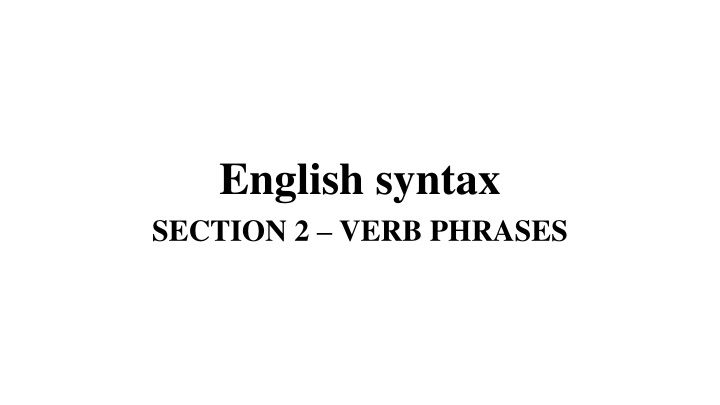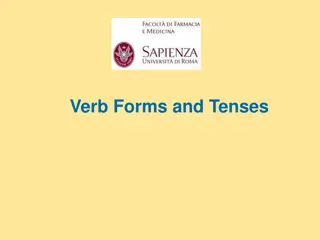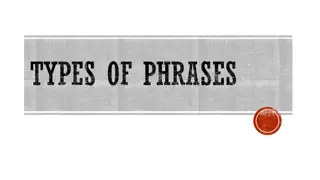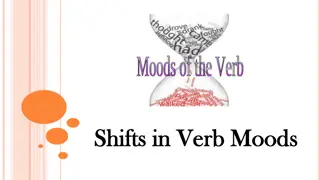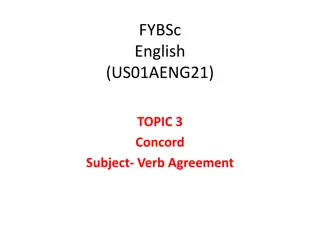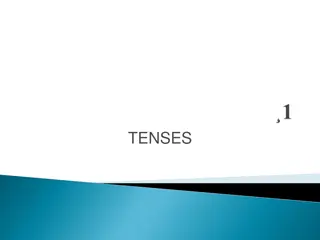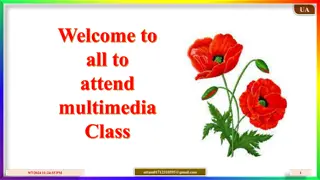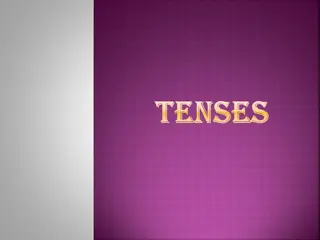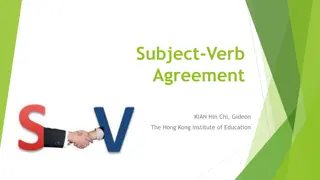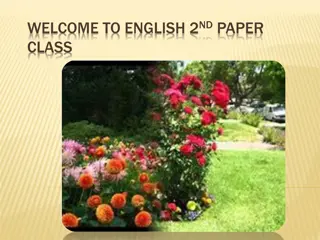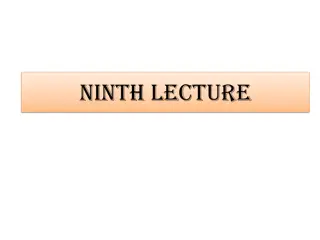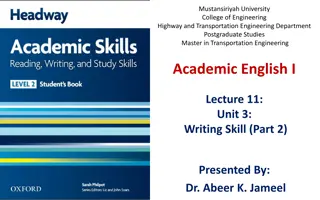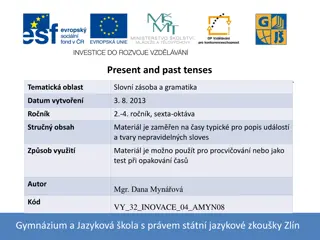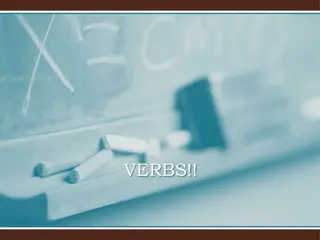English Verb Phrases: Tenses, Aspects, Moods, and Voices
Verb phrases in English encompassing tenses such as present and past, aspects like simple, progressive, perfect, and perfect-progressive, moods including indicative, subjunctive, and imperative, as well as voices like active and passive. Understand the indicative mood for statements and questions, subjunctive mood for hypothetical situations, and imperative mood for commands. Learn about verb phrases containing lexical and auxiliary verbs, along with modifiers providing additional information about actions. Dive into the structure and components of verb phrases in English grammar.
Download Presentation

Please find below an Image/Link to download the presentation.
The content on the website is provided AS IS for your information and personal use only. It may not be sold, licensed, or shared on other websites without obtaining consent from the author.If you encounter any issues during the download, it is possible that the publisher has removed the file from their server.
You are allowed to download the files provided on this website for personal or commercial use, subject to the condition that they are used lawfully. All files are the property of their respective owners.
The content on the website is provided AS IS for your information and personal use only. It may not be sold, licensed, or shared on other websites without obtaining consent from the author.
E N D
Presentation Transcript
English syntax SECTION 2 VERB PHRASES
English verbs Two tenses (th ): present and past Four aspects (th ): simple, progressive, perfect, perfect-progressive Three moods (th c): indicative, subjunctive, imperative Two voices (th i): active and passive
Indicative mood The indicative mood (th c ch nh) is a verb form that makes a statement or asks a question. For example: Jack sings every Friday. It's a statement. Is Jack the lead vocalist? It's a question. Compare the examples above with this: Sing us a song, Jack. This verb is not in the indicative mood. It is in the imperative mood. It's an order. It's not a statement or a question.
Subjunctive mood The subjunctive mood (th c gi nh) is the verb form used to explore a hypothetical situation. Examples: - If it were me, I'd go. (As this explores a hypothetical situation, was becomes were.) - I wish it were real. (As this expresses a wish, was becomes were.) - It is imperative that the game begin at once. (As this expresses a demand, begins becomes begin.) - I propose he work full time. (As this expresses a suggestion, works becomes work.)
Imperative mood The imperative mood (th c c u khi n) is a verb form that gives a command. For example: - Run! - Get out! - Empty the bin, John. Compare the examples above with this: John empties the bin. This verb is not in the imperative mood. It is in the indicative mood. Commands can include orders, requests, advice, instructions, and warnings.
Verb phrase A VERB PHRASE must contain is the VERB GROUP, in the verb group contains one lexical verb and may have up to four auxiliary verbs, besides the negative word not: EX: He may not have been being interrogated. In other words, the verb phrase in English consists of a verb group and all the words and word groups which belong with the verb group and cluster around it. The verb group itself is called the head, and the other words and word groups are the modifiers and/or the complements of the head.
Verb phrase The modifier is the generic term for all the adverbial adjuncts that optionally provide further information about the action, the process, the event, etc. talked about in the clause in which they occur. The relation between the verb group and the adverbial adjunct is one of modification: there is a one-way dependency between the verb group (as head) and the adverbial adjunct (as modifier). Thus, the use of the verb group without any adverbial adjunct is grammatically acceptable.
Verb phrase The complement is the generic term for all the completers of the verb, which are usually known as the direct object, the indirect object, the subjective complement, the objective complement. The relation between the verb group and the NP is one of complementation: there is a two-way dependency between the verb group (as head) and the NP (as complement).
Complements of verb phrase Intransitive verbs (Mono)transitive verbs Prepositional verbs Ditransitive verbs Verbs with NP PP complements
The structure of verb phrase An intransitive verb (John) sleeps. VP V V sleeps
The structure of verb phrase A (mono)transitive verb (John) bakes a cake. VP V NP V bakes a cake
The structure of verb phrase A (mono)transitive verb (John) bakes a cake. VP V NP V Det N N Art a cake bakes
The structure of verb phrase A prepositional verb (V + adverbial) (John) goes to school. VP V PP V goes to school
The structure of verb phrase A ditransitive verb (John) gave his mother some flowers. VP V NP V NP his mother some flowers gave
The structure of verb phrase A ditransitive verb (John) gave his mother some flowers. VP V NP V NP Det N Det N Q N N Poss his some flowers mother gave
The structure of verb phrase Verb with NP-PP complement (V + O + Adverbial) (John) put the book on the table. VP V PP V NP on the table put the book
The structure of verb phrase Verb with NP-PP complement (V + O + Adverbial) (John) put the book on the table. VP V PP V NP Det N N Art the book on the table put
Modifiers in verb phrase Post-verbal modifiers: Ex: John works quietly in his room in the morning. Order of post-verbal adverbs: MANNER PLACE TIME Pre-verbal modifiers Ex: John always visits his grandma at weekend.
The structure of verb phrase Post-verbal modifier (John) does the homework in his room. VP V PP V V NP Det N N Art the homework in his room do
The structure of verb phrase Post-verbal modifiers (John) does the homework in his room in the morning. VP V V PP PP V V NP Det N N Art the in the morning homework in his room do
The structure of verb phrase Pre-verbal modifier (John) always visits his grandma. VP V AdvP V V NP N Det N Poss his grandma always visits
The structure of verb phrase An important note on NP as adverbs (John) does his homework every day. VP V NP V V NP Det N N Poss his homework every day do
The structure of verb phrase An important note on NP as adverbs (John) does his homework every day. VP V NP V Det V NP N Det N N day Dist. every N Poss his homework do
Phrasal verb & Prepositional verb (We) talk about Syntax. (We) look up a word. VP VP V V PP NP V talk V about Syntax N Det (We) talk about Syntax. (We) look up a word. it N Art a look up word (We) look IT up. *(We) look up it.
Exercise 1 - Draw the tree diagram of the following phrases 1. wash your face 2. study a new lesson 3. eat breakfast every day 4. put sugar in my coffee 5. always worry about her weight 6. go to the cinema at the weekend 7. sing loudly in their garden last night 8. gave my girlfriend a new dress
Exercise 2 - Draw the tree diagram of the following phrases 1. cook dinner every day 2. withdraw money from the bank 3. always complain about the work 4. go to the park in the morning 5. walk quietly in my garden in the evening 6. sent my little daughter a new toy
N V V
